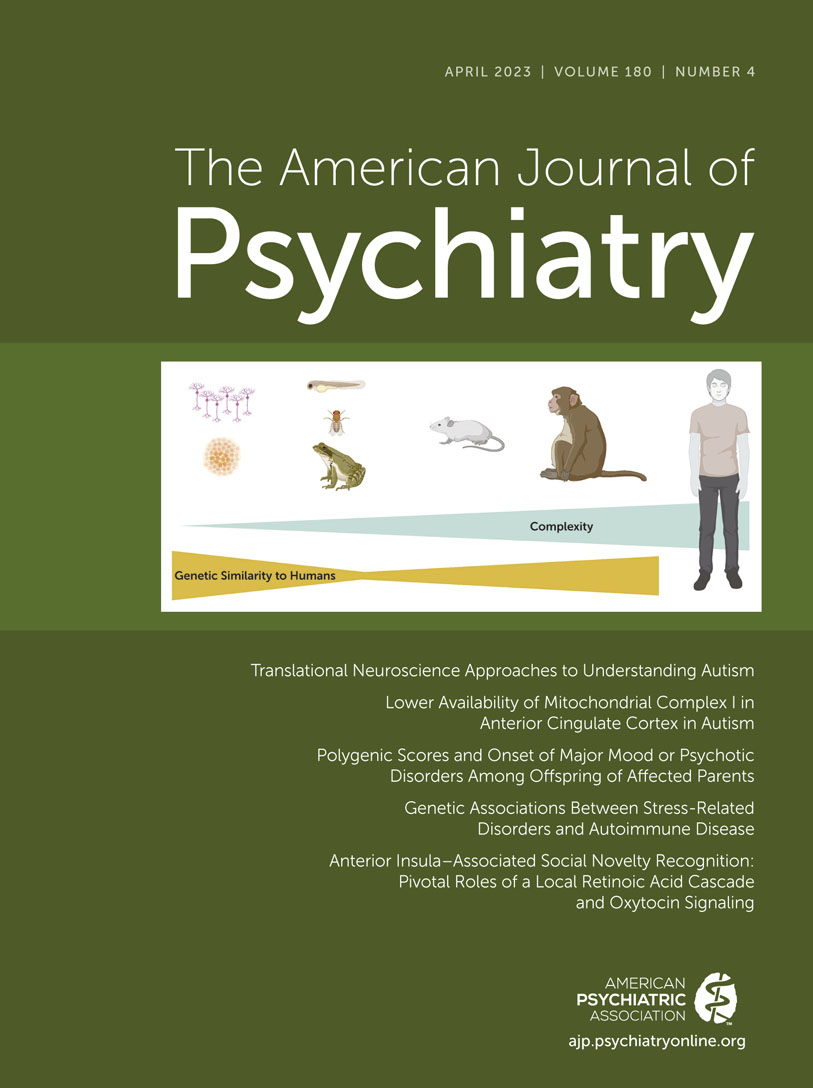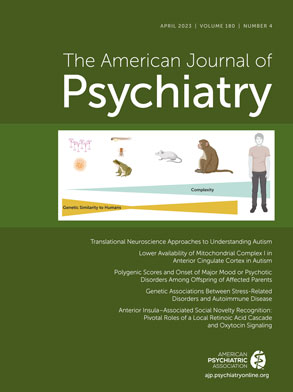“A person is known by the company they keep”
—Aesop
The significant interrelationship between stress-related disorders, including posttraumatic stress disorder (PTSD), and autoimmune and inflammatory diseases provides compelling evidence that inflammation represents both a mechanism and a target for the treatment of these psychiatric conditions (
1–
3). Indeed, data indicate that stress-related neuroendocrine alterations can drive inflammatory responses that overlap with those seen in autoimmune and inflammatory disorders. For example, special attention has been paid to the disruptive effects of chronic or traumatic stress on the hypothalamic-pituitary-adrenal (HPA) axis and the sympathetic nervous system and their effects on the regulation of the inflammatory response. HPA axis hormones, notably cortisol, play an important role in restraining inflammation, while activation of the sympathetic nervous system has been shown to mobilize immune cells from the bone marrow and stimulate intracellular inflammatory signaling pathways, including the nuclear factor kappa B (NF-kB) pathway (
1,
2,
4). Increased levels of inflammatory markers have been reliably reported in the peripheral blood of patients with stress-related disorders and PTSD, including increases in the acute-phase reactant C-reactive protein (CRP) and the inflammatory cytokines tumor necrosis factor (TNF), interleukin-1 beta, interleukin-6, and interferon gamma (
5). Moreover, increased activation of inflammatory signaling pathways has been found in blood transcriptomic analyses of PTSD patients (
2). Childhood trauma, a major risk factor for stress-related disorders and autoimmune diseases (
6), has also been linked with inflammation, in part through epigenetic effects on relevant genes, including
FKBP5, which not only plays a role in the sensitivity to cortisol through effects on the glucocorticoid receptor but also affects activation of NF-kB signaling pathways (
7). Increased inflammation in turn has been shown to engage relevant brain circuits involved in anxiety and depression (
4). Interestingly, while it is clear that stress-induced neuroendocrine disturbances can lead to increased inflammation and related behavioral changes, there is also evidence that inflammation prior to trauma can increase the likelihood of developing stress-related pathology (
1). In a study of over 2,500 male U.S. marines, predeployment CRP levels significantly predicted postdeployment PTSD (
8). These data suggest that an inflammatory bias is a risk factor for stress-related disorders and PTSD, and thus the arrow between stress-related disorders and inflammation points in both directions (
1).
Providing further support for the notion that stress-related disorders and inflammation are joined at the hip is the article by Zeng et al. (
9) in this issue of the
Journal. In this study, a variety of complementary analytic strategies were used to examine the genetic relationships between stress-related disorders, including PTSD, and autoimmune and inflammatory diseases, such as rheumatoid arthritis, ulcerative colitis, psoriasis, and insulin-dependent diabetes. In a large database of over 4 million individuals from Swedish nationwide registries, the authors observed not only a significant co-occurrence of these two types of disorders within individuals but also a co-occurrence of these two phenotypes in pairs of relatives. Their co-occurrence significantly increased as a function of ascending kinship, with a 51% greater likelihood of having both a stress-related disorder and an autoimmune disease in monozygotic twin pairs and a 28% and 16% greater likelihood in dizygotic twin pairs and full-sibling pairs, respectively. A similar increased likelihood of having an autoimmune disorder in individuals with a diagnosis of a stress-related disorder was found in the UK Biobank data, with a striking odds ratio of 2.35 (95% CI=1.90–2.91) for an autoimmune disease among individuals with an inpatient diagnosis of PTSD. This correlation on the phenotypic level was also accompanied by shared genetic risk. In fact, polygenic risk scores for stress-related disorders were associated with significantly increased risk for autoimmune diseases and vice versa. A positive genetic correlation (r
g) of 0.26 was found between stress-related disorders and autoimmune disorders, and this correlation was even stronger for PTSD specifically (r
g=0.39). The extent of this genetic correlation was as large as or larger than the one observed between PTSD and cardiovascular disease (r
g=0.24) (
10), further substantiating a genetic link between PTSD and diseases associated with inflammation, including both cardiovascular disease and autoimmune disorders. Ten genes and five functional gene modules were found to be shared between stress-related disorders and autoimmune diseases. Of note, the validity of the findings was further supported by the consistency of results when stress-related disorders (primarily adjustment disorders) and PTSD were considered separately and when each autoimmune or inflammatory disorder was analyzed individually. Overall, the findings have the advantage of the study’s having drawn from multiple databases and employing several strategies of genetic analyses, ultimately identifying commonalities at the molecular level as well as specific treatment targets for future studies. Finally, the results of the study confirm and extend other findings of genetic associations between psychiatric phenotypes, including PTSD, and immune-related phenotypes (
2).
The question then arises as to why these relationships between behavior and the immune system persist in the gene pool despite the detrimental consequences of both stress-related disorders and autoimmune and inflammatory diseases. One possibility is that these relationships derive from evolutionary pressures that required an immune and behavioral preparedness to address an ancestral environment rife with pathogens and predators that challenged survival to reproductive age (
4,
11). Aggressive immune responses support fighting infection and wound healing, while hypervigilance can protect against future attack, especially in vulnerable individuals who are infected or wounded. Of note, administration of inflammatory stimuli has been reliably shown to activate threat-related neurocircuitry involving the dorsal anterior cingulate cortex, the insula, the hippocampus, and the amygdala (
4). Nevertheless, although an aggressive immune response coupled with increased threat sensitivity and hyperarousal might have subserved evolutionary fitness in ancestral times, in the modern world, such evolutionary legacies may be less adaptive, and in conjunction with inflammation-associated lifestyles (characterized by obesogenic diets, sedentary activity, and social isolation) and exposure to trauma, they may contribute to rising rates of autoimmune and inflammatory diseases as well as stress-related disorders and PTSD.
An important implication of the shared genetic associations between stress-related disorders and autoimmune disease, especially shared genes and gene modules, is the identification of immune targets for the treatment of PTSD and other stress-related disorders. It has been demonstrated that blocking inflammation with the anti-TNF drug infliximab reduces psychic anxiety and symptoms of anhedonia in otherwise medically healthy depressed patients with high baseline levels of CRP (
12). Infliximab, which was one of the early biologic anticytokine drugs used to treat autoimmune diseases, was also found to reduce amygdala activation during an emotional face processing task using functional MRI in patients with inflammatory arthritis (
13). Consistent with these findings, anticytokine therapies have also been reported to decrease symptoms of anxiety and depression in patients with a variety of autoimmune and inflammatory disorders (
14). These data suggest that drugs used to treat autoimmune and inflammatory diseases may be relevant for the treatment of stress-related disorders such as PTSD. Of particular interest in this regard are drugs that are being developed for autoimmune diseases and target immunometabolism (
15,
16). Upon activation, immune cells, especially monocytes, which are the primary mediators of the inflammatory response, shift their metabolism from the energy-efficient oxidative phosphorylation to the relatively energy-inefficient glycolysis. This metabolic shift allows rapid access to ATP that can be used for cellular growth and proliferation and for the production of inflammatory mediators, without the need to create more mitochondria, where oxidative phosphorylation occurs. Immunometabolic shifts toward glycolysis are prominent in autoimmune and inflammatory diseases and have been described recently in stress-related psychiatric disorders, including depression (
17). Blocking signaling pathways that support this metabolic shift has become an intriguing new target for drug development for the treatment of autoimmune and inflammatory disorders (
15,
16). Interestingly, five of the 10 risk genes shared by stress-related disorders and autoimmune disease identified in the study by Zeng et al. play a role in cellular metabolism; the majority of these genes are linked to glycolysis, including
EMP2,
MYCBP,
RRAGC, and
SAMSN1, through their involvement with hypoxia-inducible factor-1 alpha, MYC, mammalian target of rapamycin, and AMP-activated protein kinase signaling pathways (
16). These data further highlight the relevance of the genetic associations between these two phenotypes and their implications for drug development, especially those linked to immunometabolism. It should be emphasized, however, that any overlap in behavioral and immune phenotypes will be relevant only in a subset of patients with stress-related disorders or PTSD, and therefore the principles of precision psychiatry should apply to drug development in this space. More specifically, clinical trials should use biomarkers to enrich for patients with the relevant immunopathology and assess outcome variables that are directly related to the impact of any treatment on the immune system and ultimately the impact of inflammation on the brain and behavior. In summary, the shared associations between stress-related and immune disorders, genetic and otherwise, provide important clues regarding the role of inflammation in the pathophysiology of these psychiatric conditions, while also shedding light on a path forward for the development of mechanism-based, targeted treatments for these diseases.

